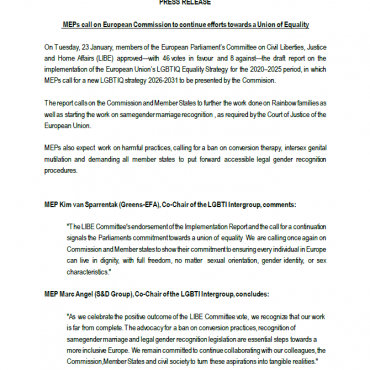Western Balkans: European Parliament completes annual LGBT assessment
This week the European Parliament adopted three new reports on the EU accession process for Bosnia and Herzegovina, the Former Yugoslav Republic of Macedonia, and on gender equality in the Western Balkans.
 The reports complete the Parliament’s annual round-up of LGBT rights in the Western Balkans and Turkey. Last month, MEPs already examined the situation in Croatia, Montenegro, Serbia, Kosovo and Turkey.
The reports complete the Parliament’s annual round-up of LGBT rights in the Western Balkans and Turkey. Last month, MEPs already examined the situation in Croatia, Montenegro, Serbia, Kosovo and Turkey.
In its report adopted today on Bosnia and Herzegovina, the European Parliament expresses concerns about “hate speech, threats and harassment directed at LGBT people”, and recalls that efforts must continue to achieve “an inclusive and tolerant society”. Anti-discrimination laws and policies should also be enforced better.
The Parliament’s report on Macedonia welcomes the opening of a new support office for the LGBT community, but “expresses concern at the act of vandalism committed against it” already. MEPs also encouraged politicians to condemn homophobic and transphobic discrimination more vocally, and regretted the media’s ongoing anti-LGBT discourse.
Michael Cashman MEP, Co-President of the LGBT Intergroup in the European Parliament, commented: “It’s fortunate that fundamental rights keep progressing—albeit slowly—in the Western Balkans, which are an integral part of our European family. The Council of Europe’s work on LGBT rights has been particularly helpful, and I hope national leadership can begin to emerge on these issues in the coming years.”
The Parliament also adopted a report on women’s rights in the Balkan accession countries. In it, MEPs note with concern that women who defend LGBT rights “are regular targets of hate speech, threats and physical attacks”. They encourage accession countries to adopt legislation against hate crimes and discrimination, and “to denounce hatred and violence on grounds of sexual orientation, gender identity or gender expression”.
The author’s report, Marije Cornelissen MEP, explained: “I’m glad the European Parliament made the point that genuine gender equality can only be achieved if lesbian, gay, bisexual and transgender people are fully equal. The same systems of discrimination and oppression work against LGBT people and women, and they are usually wielded by the same opponents of equality.”
“Accession countries are on the right track, but recent efforts towards full gender equality must continue.”
Read more:
- Read the European Parliament resolution on Bosnia and Herzegovina (see paragraph 21)
- Read the European Parliament resolution on the former Yugoslav Republic of Macedonia (see paragraphs 31 & 32)
- Read the European Parliament resolution on women’s rights in the Balkan accession countries (see paragraph 15, 18 & 20)
- Council of Europe: Combating discrimination on the grounds of sexual orientation or gender identity






